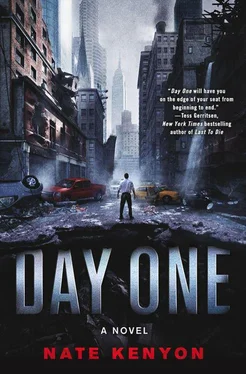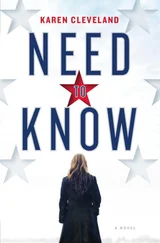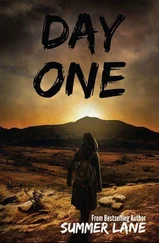“It’s a straight shot,” Vasco said, pointing the light along the tunnel toward downtown. His voice echoed through the emptiness of the platform. “Trains aren’t running, so there’s no danger. Might not be the most pleasant way to go, but it’ll bring us right to Grand Central.”
“And the Financial District?” Hanscomb said. “My husband’s building is at Two Hundred West Street.”
“You could follow the number four tracks to Bowling Green,” Vasco said. “Then go to the water. It’s a much longer walk, though.” The flashlight made it hard to see his face. “He’s dead, you know that, right? Even if he’s not, how are you going to find him? And what are you gonna do even if you actually make it down there?”
“Don’t you say that,” Hanscomb said. She was trembling. “Don’t you dare.”
“What’s your husband’s name, Sarah?” Hawke said.
“Harold,” she said. “They called him Harry, but I never did. It was always Harold.”
Past tense. Hanscomb’s lips were white as she pressed them together. She was on the edge of collapse. Hawke wanted her to focus, wanted to give her something that built her strength and bound them. “I’ve got a son; I think I told you. Another baby on the way. You have kids?”
“Two,” she said. A bittersweet smile touched her face. “They’re both in college now. Cliché, isn’t it? House in the suburbs, Wall Street yuppie husband, manicures and yoga and afternoon cocktails while the kids were at dance and lacrosse practice. I used to drive a minivan before the Cadillac. That was a gift from my husband, supposed to mark the transition when Jean went off to school.”
“Jean?”
“My youngest. She’s at Smith. Taylor is in his senior year at USC.” She covered her mouth with a hand. Her face was ashen, hollow, as if collapsing upon itself. “You don’t think this has spread beyond New York, do you? They aren’t…” She couldn’t seem to go on.
“I’m sure they’re fine,” he said. He touched her arm, felt her shaking. “Which is why we need to focus on getting ourselves out of the city. They’re going to be worried about you.”
She nodded, bright red spots of color blooming in her cheeks. “Jean’s so nervous, always wanting to know the door’s locked or I’m driving the speed limit. She’ll drive Taylor nuts with this. He…” She paused, swallowed, shaking, and didn’t speak again. Hawke was ashamed. Asking her about her kids had been a mistake. Hanscomb had been little more than an irritating distraction to him since the moment she had crashed the SUV, but she had a life and a family like anyone else. She had kept her mind occupied with her husband’s plight, but that only masked the real terror. This façade she had built around herself was about to come crashing down, and Hawke saw all the pain waiting behind it.
He felt his own panic begin to creep closer to the surface, thinking of Robin’s scream, of the blood spattered across the wall. He fought it back and touched the light worm of scar across the last knuckle of his pinkie. His mother always said he had a knack for staying calm under pressure; when he was eight, he had caught the finger in a car door and it was nearly severed. She liked to tell people how he had simply clutched it to his shirt and said, I need to go to the doctor, as if he were commenting on the weather while blood pumped like a fountain down his shirt. And the night his father died, Hawke had driven to the hospital, where he’d found the man slumped with eyes half-open, mouth slack, having suffered a stroke due to complications of his alcoholism. Hawke had sensed something irreversibly wrong as he sat on the edge of the bed; one pupil was dilated, the other a pinprick of black. Even though the doctors explained that his father was brain-dead and couldn’t hear him, he held the old man’s calloused hand as they shut off the machines, as his chest hitched and sighed, and told him to let go, that it would be over soon. It was the last time he would see his dad before the funeral, and he never shed a tear.
As a child, he had been scared of death. But he didn’t feel that way anymore. He was numb to it for himself; it would come eventually whether he was ready or not. But he was terrified for Thomas. The thought of his boy huddled somewhere, crying for his daddy, punched the air from his chest.
Vasco had maneuvered his legs over the side of the platform, and now he dropped to the tracks with a grunt, the flashlight beam flickering before coming back strong. “We’re wasting time,” he called from below. “Long walk ahead of us.”
* * *
Hawke went over the edge next, and helped Hanscomb and Young down. “Watch the third rail,” he said. “We don’t know for sure if the power’s totally out.”
Vasco played the light along the brightly polished silver rail, raised a few inches above the track bed. “You never hear of a rat getting fried down here,” he said absently, as if he felt the need to say something while his mind was somewhere else. “You know why? Because they’re smart. They go underneath it, or they jump up on it and then jump down. They never make contact while standing on the ground. No way to complete the circuit.”
Nobody answered him. They stood in the hot, suffocating darkness for a moment, gathering their strength. The tunnel was terrifying and damp, the walls seeming to close in on them. There were no emergency lights on down here, and the blackness ate the flashlight beam like a ravenous ghost. Vasco flicked the light up the tunnel. Up where the track curved away, a train sat like a hulking shadow, motionless and dead. The light barely picked it up at all, just a shape and glint before the darkness dissolved everything. Hawke thought he heard something, muffled and unsettling like the moan he’d heard earlier, and he could make out the conductor’s glass window like a milky eye staring at them. But nothing moved; all was still and cold.
Vasco turned back, toward Grand Central. The tunnel was empty that way, running to a point before the light was swallowed up completely. Things scuttled out of sight, rats or something else unseen and better left alone. Hawke still felt the effects of the carbon monoxide from the hospital in his trembling legs, but the oxygen he’d taken in had helped banish the nausea and dreamlike visions. He remembered the images of the dead scratching at the walls of their refrigerated lockers, the shadowy shape that had appeared at the edge of his sight.
It crossed Hawke’s mind that they were all probably still in shock, running on autopilot, and sooner or later they would have to pay for that. There were toxins still running through their veins; they had witnessed unspeakable violence and gruesome deaths and everything about the world that they had known and come to trust had been torn away. Now they were down in the dark and being hunted. He wanted to believe they were like the rats, too smart to put their paws on the rail, but he wasn’t sure. He wondered if they would reach a point where they would simply give up, like deer going down under the attack of wolves, glassy-eyed and exposing their throats for the kill.
Vasco started forward, stepping carefully along the gap between the two rails on their side, staying close to the wall of the tunnel as if it might afford some protection. The rest of them kept near the flashlight beam, Hanscomb right behind Vasco, Young and Hawke bringing up the rear. Hawke had to watch where Vasco stepped and remember to tread carefully as the darkness closed in around him and they left the faint glow of the platform’s emergency lights behind. He didn’t want to lose his footing. He felt the panic creeping up on him again like slow-moving ice, different than it had before, and he fought it back, afraid that it would overwhelm him and send him running headlong through the dark.
Читать дальше












